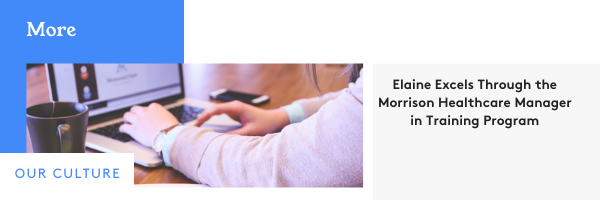
I worked through high school and college as a caddy at the Siwanoy Country Club in Bronxville, N.Y. I tell everyone it’s the best job I could have had because it helped prepare me for real life – and working in foodservice.
When I started at 15, I did not know anything about golf. At first, I made plenty of mistakes, such as dropping the golf bag on the putting green. But I wanted to make money and quickly realized I not only had to learn the game but find a way to connect with the wide range of people I met. I carried bags for millionaires but also worked with other caddies from the Bronx, many who were recent immigrants. The lesson: Everyone is different. So, I learned how to adapt and connect with people from many different backgrounds.

Now, at 22, many of the same life lessons apply if I want to be a successful manager in foodservice. After graduating from the University of Delaware in June with a degree in hospitality management, I joined Morrison and worked for 12 weeks at the Westchester Medical Center as part of the Manager in Training (MIT) program.
Westchester is a massive, 895-bed regional trauma center. But, just like when I started out as a caddy, I’ve been putting in long hours to learn how foodservice works in healthcare while adapting my management style to connect with a wide variety of people.
Learning from the Ground Up
When I began my training in June, I quickly realized that pretty much everyone working in foodservice at Westchester knew more than me. Fortunately, other managers and associates welcomed me and showed patience when I made my share of mistakes.
And there were plenty of times when I needed their help. Once the program began, I quickly realized that things could get hectic in a hurry. Learning to stay composed under stress was certainly one of the difficult parts of my MIT journey. But it taught me that I need to understand how food flowed from the kitchen to the patient to successfully run the account.
I also learned the finer points of serving patients with a wide variety of needs. For example, as part of the food preparation, we build “safe” trays for people with special needs. While I was learning so much about the job, I also wanted to build working relationships with everyone. One way to build relationships is to demonstrate a strong work ethic and a willingness to do any job and make sure it’s done right. Even when I didn’t know much about the foodservice operation, working harder and taking on any job would show my commitment to the team.
And that means doing the job of any associate, just not a manager.

For example, after some dining associates called in sick on a Sunday in early October, I worked in the kitchen to help load food trays into our trucks and make sure certain patients received their food on time. Many associates and coworkers have expressed their thanks for my willingness to pitch in when the going gets tough. By building that bond, I know it will pay off down the road for our clients and patients.
I’m still learning what it takes to run a major account. But I can always make sure food is served to our patients quickly and efficiently. As long as they are getting quality food at the right temperature and in a timely manner, everything else will come.
Foodservice – A Family Trait
Foodservice and operations management are in my blood. My parents have worked a lifetime in foodservice and retail operations and it’s one of the reasons I’ve chosen a career in foodservice management.
At 18, my father was a store manager at the former Grand Union Supermarkets chain in the Bronx. By 24, he was a regional manager, overseeing five stores. Later in his career, he worked in management positions for Bimbo Bakeries, the world’s largest bread distributor, and PepsiCo. And my mother is an operations manager for Macy’s in Yonkers, N.Y.
I also have fond memories of growing up around food. I remember when my father brought home new products from the bakery – cookies, pumpkin bread and other goods with special flavors. Foodservice is a good business that is always changing and I’m fortunate to have a chance to work in it.

After graduating from the MIT program in September, I started as the Patient Services Manager at Westchester. While I learned much about foodservice management, the most rewarding aspect was the camaraderie with others. Hearing an associate tell me they were glad I was working with them was more inspiring than hearing it from a direct manager. My hope is that I can inspire others to do their best and help our clients and associates.





